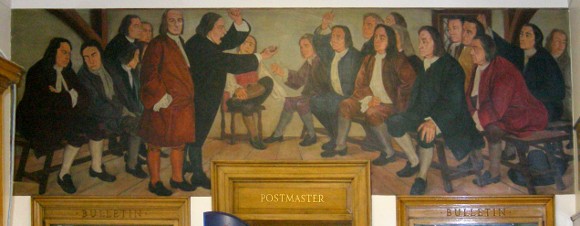Some bits and pieces from here and there:
- The emerging Spanish tax resistance movement, which combines the war tax resistance movement with a broader anti-austerity / community-autonomy focus, has put out a video (and has helpfully translated it into English for its overseas fans):
- An article about Catholic women activists included a note about war tax resistance in Italy that was news to me (translation mine):
War tax resisters and peace activists in war zones
In , in Italy, Beati Costruttori Della Pace [“blessed are the peacemakers”] was born. While it is not an exclusively female organization, it emphasizes the participation of women. At its creation, religious people were involved who were motivated by war tax resistance. Instrumental at its launch was a document defending this practice signed in by Lorenzo Belloni, bishop of Trieste and president of the Peace & Justice Commission, and by ten thousand laypeople and five thousand nuns, monks, and priests. All of them pledged to practice and spread war tax resistance. The founding document says: “peace is central to the Church if it wants to remain faithful to the risen Christ. Peace cannot be delegated but is entrusted to each person in everyday life.” This association, in addition to war tax resistance, has organized nonviolent intervention marches in war zones like Sarajevo, Kivu, or Ramallah. It also promotes campaigns against the manufacture of landmines, nuclear energy, and military bases on Italian soil.

- The Historic Ipswich Massachusetts blog
pointed out that the Ipswich post office has a mural representing an assembly of colonial Americans debating how they would resist taxes that had been illegally imposed by Governor Andros:
This act of resistance has been called “the foundation of American Democracy,” and was the beginning of a series of events which culminated in the Revolutionary War. The act of opposition is commemorated in the seal of the town of Ipswich, which bears the motto, “The Birthplace of American Independence .”
In John Andrews was chairman of the selectmen, the town clerk was John Appleton and the minister at Chebacco Parish was the popular John Wise. They met with other town leaders to discuss the command of crown-appointed governor Sir Edmond Andros and his council that a new tax be assessed on the king’s subjects. A town meeting was hastily organized the next day which voted that “no taxes should be Levied upon the Subjects without consent of the Assembly chosen by the Freeholders.” For this act Rev. Wise, John Andrews, John Appleton, Samuel Appleton, William Goodhue, Robert Kinsman, and Thomas French were arrested and tried before the court in Boston. They were severely handled, imprisoned for several weeks and fined. Sam Appleton refused to give the bond and was kept a prisoner under very harsh conditions.
A group of provincial militia and citizens gathered in Boston on and arrested several dominion officials as well as members of the Church of England who were suspected of sympathizing with the administration. Major Samuel Appleton was among the men who helped escort Andros to Castle Island in Boston Harbor as a prisoner. Leaders of the former Massachusetts Bay Colony then reclaimed control of the government, rescinded the tax order, and Andros was shipped back to England. Rhode Island and Connecticut resumed governance under their earlier charters as well.

